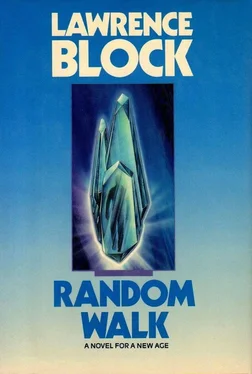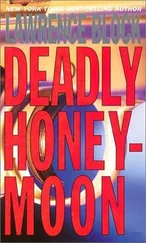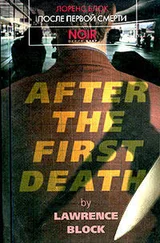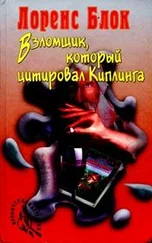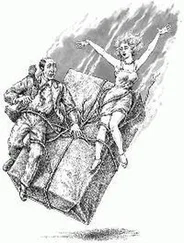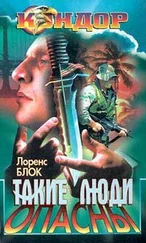Jordan was Thom’s age, thirteen, but not as tall. He was the son of a black father and a Flathead Indian mother. The two boys had got to talking in front of a shelf of science fiction paperbacks at Goody’s Trading Post, where they discovered that they liked a lot of the same authors. They got Cokes from a machine and stood around drinking them, and Thom told Jordan he was from Indiana, and that he’d never even seen an Indian until he crossed the Mississippi River.
“You got black people back where you are?” Jordan wanted to know.
“Oh, sure. The school I used to go to, I think about a third of the kids were black.”
“No shit? Because it’s the other way around here. We got Indians up the ass, but it’s being half nigger that makes me exotic.”
Jordan never said anything about joining the walk. He didn’t pack any clothes or bring along anything other than what he was wearing. But he stuck close to Thom, joined Thom and Sara and John for lunch, and, when they all met in front of the post office, he was there with them, acting as if it were a foregone conclusion that he was a member of the party.
Douglas was a friend of Gary’s, a transplanted Californian who worked at Western Auto and had a shop at his house where he produced handmade hunting knives as a sideline. The knives sold readily at knife and gun shows for upwards of two hundred dollars, but each one represented a minimum of fifty hours work and a substantial investment in high-grade steel and fancy woods or ivories for the grips, so there was little profit in the trade.
Douglas was ready to go as soon as he learned what Gary was up to. The woman he lived with, also a former San Diegan, thought it was the craziest thing she’d ever heard of. When she learned that the group included a blind woman and a nursing infant, she declared that she’d heard everything.
“The only thing is you’re all headed in the wrong direction,” she said. “Aren’t lemmings supposed to throw themselves into the sea?”
Douglas told her he was going. She said to be sure and have a good time, and send her a postcard now and then. “Why don’t you just meet the people?” he suggested. “You know Gary’s all right.”
“I always used to think he was one of your more normal friends.”
“So give it a try. Meet the people, maybe walk out with them this afternoon. If you don’t feel good about it you can always turn around and come back.”
“Great, I can walk all the way back alone.”
“You can hitch. Besides, if you don’t like it the chances are I won’t like it either, and we can hitch back together. Just join in for a few miles, Bev.”
“This has a familiar ring,” she said. “It’s like a couple of years ago when you swore you were only going to put the tip in.”
“If you don’t like it—”
“That’s the trouble, Douglas. I wind up liking it.”
Douglas was a sort of half-assed survivalist, and Gary had a hard time talking him out of bringing along a ton of camping gear. He was sure they’d be more comfortable with a tent and sleeping bags, and he wanted to bring a mess kit and a compass and water purification tablets and a hatchet and fishhooks and line and God knew what else. “These people are into traveling real light,” Gary told him. “If it weighs a lot or if it won’t fit in a small pack, leave it behind.”
“But you can’t sleep uncovered in the mountains,” Douglas insisted. “You’ll freeze.”
“They’ve been doing it all along.”
“Well, I’m certainly taking the first aid kit. It doesn’t make sense to go anywhere without gauze and tape and antiseptic and aspirin.”
“Don’t really need aspirin,” Gary said, grinning. “We got an old boy from Klamath Falls who puts his hands around your head and cures your headache.”
“How is he with menstrual cramps?” Bev wanted to know. Gary said it hadn’t come up, but he was sure Jody would be willing to try. “Well, why not?” she said. “It won’t be the craziest thing I did all day. But he better watch where he puts his hands.”
They left Burns in a compact group. As they put a little distance between themselves and the city, they tended to spread out along the highway in twos and threes. Here and there someone walked alone, but usually not for long.
Guthrie asked Sara if she’d had a chance to get a reading on Jordan.
“I just picked up a lot of self-hatred,” she said. “Nobody wants him and he doesn’t belong anywhere.”
“Yeah, I got that much and I’m not even blind. I was a little concerned about him just joining up with us. As far as I can tell he didn’t say a word to anyone back in Burns. He just walked on out of town. So I asked him if his people wouldn’t come after us to get him back. You read about these cults spiriting children away from their parents; I sure don’t want to turn into something like that.”
“What did he say?”
“He said he didn’t think the people of Burns were going to get up a posse to bring back a half-nigger Indian. He said his mother was in the state hospital and his father was doing time for manslaughter, and the aunt he lived with would do a victory dance if she ever noticed he was gone. I’m glad he’s with us, the poor little son of a bitch. I don’t think he could have had too good a life in Burns.”
“Or too long a one, either.”
“He’ll be good company for your boy, too.”
“He’ll be good company for all of us.”
“Uh-huh.” They walked a little ways in silence, and then he said, “People have so goddam much to walk away from. Every time I find myself wondering what we’re walking toward, I tell myself that’s beside the point. Sara, I read a newspaper back in Burns and there wasn’t a single good thing in it. The baseball scores were the closest thing to good news, and even there somebody had to lose for everybody who won. I don’t usually get bothered by the fact that major league baseball is a zero-sum universe, but that puts it ahead of the rest of the world, where one person can lose without somebody else winning.”
“I suppose I’ll miss being able to read a paper,” she said. “But so far I haven’t.”
“There was a man in Washington State who killed his wife and kids with a shotgun and then hanged himself with his belt. All that went through my mind reading the story was wondering why he’d used the shotgun on the rest of them and then used a different method on himself. I asked Jody.”
“I’ll bet he had an answer.”
“He had several suggestions. Maybe the guy ran out of shells. Maybe he was sickened by the mess a shotgun makes. Maybe the gun barrel was longer than his arm, and it didn’t occur to him that he could work the trigger with his toe.”
“Maybe he knew you could get an erection by hanging yourself.”
“You can?”
“So I understand. There are accidental suicides all the time, people trying to half hang themselves for sexual pleasure who go a little farther than they intended.”
“This really happens?”
“Oh, the literature’s full of it. It happens quite frequently.”
He shook his head. “I suppose all knowledge is valuable,” he said, “but I’d have a hard time saying how my life is richer for knowing that.”
Three hours out of Burns, a Ford Taurus passed them at high speed, heading west. A few minutes later the same car returned in the eastbound lane, braking hard and fishtailing to a stop, then pulling onto the shoulder across the road from the main body of walkers.
The driver got out of the car, slammed the door, and stalked across the road. He was a man in his mid-thirties, average in height and build. He was wearing a three-piece navy pinstripe suit, a yellow tie with black pin dots, and a pair of black scotch-grain wingtip shoes. He had taken his car keys with him, and he strode along with them clutched in one hand.
Читать дальше
